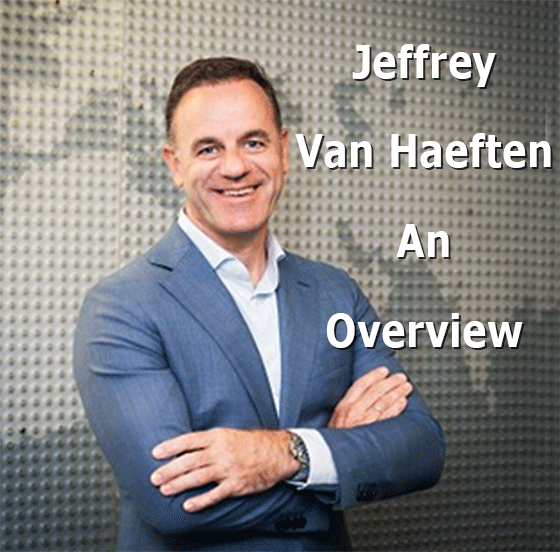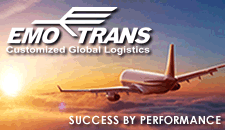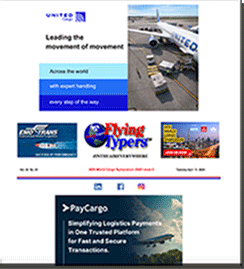
Geoffrey Arend of Air Cargo News (that’s me, folks!) met Jeffrey Van Haeften, Senior Vice President of Commercial, Emirates SkyCargo, just before IATA’s WCS in Dubai in the springtime.
Originally it was an interview, but in the end it became something more thoughtful and unexpected and it is best told as a short essay. With our readers’ support we give you Van Haeften’s views on air cargo, trade events and beyond, in first person(s).
Jeffrey speaking to Geoffrey . . . “Throughout my career, I have had the pleasure of working with a number of great leaders and team members, and I have learned key skills from all of them, whether it is a creative way of problem solving, the importance of diplomacy, tools for better collaboration or decisive decision making. In my experience, the most effective and impactful leaders are convincing but also open to being convinced. They are open to the perspectives and opinion from different people and welcome healthy debate, as long as all interactions are underpinned by respect. These are facts that made me what I am today and I am thankful to all these exceptional individuals.” Why in Dubai was the question on our lips and . . . “As home to so many encounters including the event that brought TIACA back in 1996, Dubai has improved in the quality of industry events. Industry events remain an important part of our calendar, from meeting and networking with customers, both existing and potential, to showcasing the latest we have to offer. One challenge, if we have to find one and this is not exclusive to logistics, is to continue the conversation post-event, especially when it comes to industry-wide discussions or advancements.
Dubai as host city for World Cargo Symposium brings the hope of promise to an entire industry by gathering some of the best and brightest logisticians on the planet. IATA’s World Cargo Symposium is the largest and most prestigious air cargo annual event and we are very pleased that this year’s event will be hosted in Dubai. The themes of digitalisation, sustainability and safety and security are very relevant both for our industry and Dubai, a city which exemplifies the success that can be built on commerce, innovation, tourism, technology and, of course, logistics. We look forward to many fruitful conversations about the future of our industry against the backdrop of our headquarters.
Air cargo is well served at its meetings and trade shows. Uniting multiple stakeholders across the logistics ecosystem, under one agenda, is important to facilitate discussion and advance the industry – after all, no one entity can achieve everything alone.
However, we need to be discerning with trade events, and recognize which ones play an instrumental role in progressing the industry. To provide an example other than WCS, Air Cargo Europe is a leading trade show, bringing together stakeholders across the ecosystem and across Europe, making it a truly regional event. We always attend with a large but relevant delegation, to meet with our partners and customers and ensure we continue to elevate our work in Europe. It would be good to see similar trade shows, of this scale, across other markets too.
While I cannot reveal too much, as this year’s host airline at WCS, we are set to showcase our expanding capabilities and commitment to driving efficiency, innovation, and connectivity across the air cargo industry. Every step we take is a step towards achieving our 10-year strategic roadmap that will see us double our capacity and add 20 new destinations to our global network so our path for 2025 and beyond is clear.
The backbone of our operations, and a key contributor to our success, is our world-class operations at our hub in Dubai. Operating across both DXB and DWC, our combined hub is the world’s largest and most technologically advanced cargo handling facility in the world, offering 185,000 sqm. dedicated cargo area and a capacity of 2.3 million tonnes per annum across both operations. As a team, we work very closely to ensure that operational procedures enhance commercial demand, ensuring seamless collaboration. We look forward to further elevating our facilities as we develop DWC, dubbed the airport of the future. Throughout 2024 and the first quarter of 2025, our offering has remained in high demand, with both new and existing customers. Our innovative product portfolio, extensive global network, all wide-body fleet and world-class capabilities mean we continue to outperform the market. We are confident in Emirates SkyCargo’s ongoing role in facilitating global trade, but we will not rest on our laurels. We are continually looking for opportunities to innovate and enhance our operations, to ensure we remain a steadfast partner to our customers all over the globe.
Talking about cooperation, cooperation is essential at every level of our operations. Interline agreements with other airlines enable us to reach more destinations for our customers, while partnerships with digital marketplaces allow us to reach our customers where they are. We have developed new products in coordination with key customers and collaborated with ground handling partners to create pharma corridors in key markets, connecting origin and destination with consistent cool chain capabilities to mitigate risk in transit.
We also believe cooperation is key for advancing key issues within our industry. For example, Emirates was the first airline to join the Move to -15oC, a coalition that aims to redefine frozen food temperature standards and reduce energy consumption in the frozen food supply chain. Research suggests that a three-degree change in temperature could make a significant environmental impact with no compromise on food quality and safety; the Coalition brings together cross-industry partners to explore the real-world implementation of this research through data sharing, suggested operational revisions, collaborating with members and stakeholders, as well as engaging with policymakers and regulators to educate and advocate. Collaborating with our customers, partners and stakeholders will continue to be a priority for Emirates SkyCargo, there is no question about this.
Speaking of developments, new routes, services and opportunities, Emirates SkyCargo is set for a transformative 2025, driven by fleet expansion, digital innovation, and operational advancements. A major highlight is our fleet expansion. By December 2026, we aim to operate a fleet of 21 freighters, which is a strategic investment to elevate our global connectivity and further enhance reliability. This is complemented by our leasing strategy, which helps us unlock immediate capacity. We have always harnessed the breadth of the Emirates passenger fleet to transport cargo worldwide, which adds belly-hold capacity from a further 250 aircraft. This fleet is also set to grow, with the ongoing deliveries of the Emirates’ A350 aircraft. By utilising both freighters and passenger aircraft, we offer our customers near unmatched flexibility over their cargo, enabling us to deliver their goods swiftly, reliably and efficiently, all over the globe.
The additional aircraft enable us to increase our freighter network. In January, we launched a weekly freighter to Copenhagen, to support the increase volume of pharmaceuticals in the market. Over the next two years, we plan to expand this further to better serve our global customers.
Looking at recent developments, as a global airline, Emirates SkyCargo has a strong presence in all regions and we continue to see a strong demand for airfreight capacity. While Chinese eCommerce is a significant driver of tonnage, our operations are diverse and there is also growth in other markets. We see a high demand for specialist logistics solutions, with pharmaceuticals and perishables continuing to drive volume. Both are sectors that consistently perform well as they tend to be less susceptible to economic downturns or even natural disasters.
We are seeing some impact on growth attributable to the latest tariffs, but globally we remain positive. Looking ahead, the global airfreight market continues to experience robust growth with IATA predicting that global air cargo volumes will increase by 5.8% worldwide in 2025. By operating a mix of dedicated freighters and the belly-hold capacity in our passenger fleet, we are able to deploy freighters to places where growth is happening.
Historically, air freight has been the preferred method of transport for high value commodities, but one surprising change we have seen recently is an increase in lower value goods travelling via air. This is driven directly by the shift in consumer behaviour, especially the increasing demand for e-Commerce. Given the speed of fulfilment customers expect, even for cross-border air freight is the fastest way to move their goods. While we do see huge demand for e-Commerce movements from China, it is not the only market that is experiencing this shift: in fact, it is almost global.
You wanted to know what would I change for better results . . . We need to further accelerate the adoption of digital tools across the industry, to streamline business processes, drive efficiencies and expedite the movement of goods worldwide. Emerging technologies are the building blocks of the future, and we are fully committed to embracing them. AI and IoT allow us to optimize every aspect of our operations, from predictive analytics to real-time shipment tracking. Blockchain, on the other hand, offers unparalleled transparency and security. These innovations are not just tools—they are transformative forces that will define the future of logistics.
Technology and especially automation, will help address industry wide challenges with labour shortages. From streamlining workload management in warehouses to attracting top talent who are looking for cutting-edge tools to facilitate their role, the impactful use of technology will be essential for the future of logistics. This is something we are currently exploring as we look towards enhancing our operations at Al Maktoum International Airport (DWC), the airport of the future.
Digital innovations, such as AI, is the cornerstone of our transformation, and will play a key role in empowering our teams and our customers with unparalleled control, speed, and convenience. We see these tools as more than just operational enhancements—they symbolize our commitment to building a future where cargo logistics are seamless, intelligent, and adaptive. By harnessing data and digital platforms, we are not only enhancing customer experiences but reimagining what is possible in air cargo.
In terms of what is to be expected with regard to attracting talented younger staff, as an employer of choice, we proudly attract and retain the best talent in the industry, who are essential to our success. Learning and Development is prioritised across the Emirates Group, with all employees given access to courses, new learning paths and LinkedIn Learning. Building on this, we launched a bespoke Emirates SkyCargo leadership programme for high-performing cargo managers, designed to equip them with future-ready skills, such as AI and innovation. Devised in-house in coordination with Emirates Learning & Talent and HR teams and AviationNOW, an arm of the GrowNOW Group and member of The International Air Cargo Association (TIACA), the programme advances the skillset within our talent pool, ensuring our business is ready for the future. In January, our first cohort of candidates graduated, with the second cycle set to begin in April.”
With this hopeful promise looking at the future, Van Haeften left us with the assurance to meet personally soon. Thanks, Jeffrey, definitely this is not just an interview, it is a winning business strategy!
Geoffrey Arend |





 Vol. 24 No. 18
Vol. 24 No. 18
 Vol. 24 No. 20
Vol. 24 No. 20